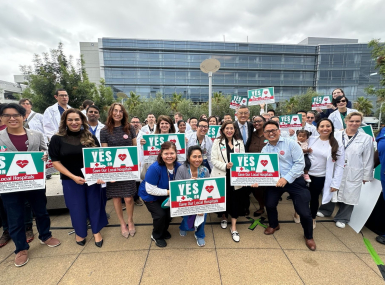New legislative proposals aim to enhance COVID-19 contact tracing
Author

Blaire Bryant
Upcoming Events
Related News

Key Takeaways
Congressional proposals to improve COVID-19 contact tracing are taking center stage as legislators debate next steps on a fifth coronavirus aid package. Contact tracing is a public health strategy that has for decades been successfully used to combat infectious disease outbreaks across the globe. The process identifies people who may have been exposed to an individual with an infectious disease.
Contact tracing has become a centerpiece of state and local efforts to curb community transmission of COVID-19 and, in some states, begin the reopening process. A NACo County News report found that state departments of health are playing a critical role in hiring professional contact tracers and deploying those individuals to local health departments, while some counties are recruiting existing employees on administrative leave to fill in as contact tracers in their communities.
According to a statement released by the National Association of County and City Health Officials (NACCHO), to support a force of at least 100,000 contract tracers, Congress would need to appropriate at least $3.7 billion in emergency supplemental funding to local, state, territorial, tribal, and federal public health agencies.
Previous coronavirus response bills – including the CARES Act (P.L. 116-136) omnibus – dedicated new federal resources to improve contact tracing capacity at the state and local level. The new proposals, shown below, would build on previous measures to tap new federal resources and manpower to track COVID-19 cases. The bills additionally emphasize the importance of a strong intergovernmental partnership to fully address the pandemic – a key NACo priority in the federal response to COVID-19.
-
COVID-19 Testing, Reaching and Contacting Everyone (TRACE) Act (H.R. 6666, Rep. Bobby Bush) – The legislation would enable the CDC to award grants for testing, contact tracing, monitoring and other activities to address COVID-19. Grants would support entities including federally qualified health centers (FQHCs), non-profit organizations, and certain schools and hospitals. In selecting grant recipients, CDC would prioritize applicants operating in coronavirus hot spots and medically underserved communities and make efforts to hire individuals from the communities where grant activities occur.
-
Coronavirus Containment Corps Act (H.R. 6871/S. __, Rep. Andy Levin, Sen. Elizabeth Warren) – The legislation, co-sponsored in the Senate by Sens. Tina Smith (D-Minn.) and Jeff Merkley (D-Ore.), would require the Centers for Disease Control and Prevention (CDC) to develop a national contact tracing strategy within 21 days in collaboration with state, local and tribal health officials.
It would also require the CDC to include provisions that prevent misusing patient data, anonymize data and ensure automatic data deletion and prohibit data-sharing within the federal government except within the CDC and Indian Health Service. The legislation would provide $10 billion in funding to states and Native American tribes to hire more than 100,000 tracers and other support personnel. It would also provide $500 million to state and tribal hiring agencies to find a hiring pool for the tracers, prioritizing those who have lost their jobs during the pandemic.
-
Health Force and Resilience Force Act of 2020 (S.3606/H.R.6808, Sen. Kirsten Gillibrand, Rep. Jason Crow) – The legislation would create a “Health Force” within the CDC composed of community members dedicated to responding to public health emergencies, as defined by the Secretary of the U.S. Department of Health and Human Services (HHS). Health Force members would fill key gaps in personnel to provide increased capacity to address ongoing and future public health needs.
-
HEROES Act (H.R. 6800, Rep. Nita Lowey): As passed by the U.S. House, the legislation would appropriate $75 billion to the Centers for Disease Control and Prevention (CDC) to establish a new national system and grant program for COVID-19 testing, contact tracing, surveillance, containment and mitigation. In a key win for counties, the bill would also direct the CDC to partner with state, local, tribal and territorial health departments to implement a “nationwide evidence-based system” for COVID-19 testing, contact tracing and mitigation activities. NACo’s full analysis of the HEROES Act can be found at this link.
-
National Testing and Contract Tracing (CONTACT) Initiative UNITE Act (S.3642, Sens. Ed Markey and Chris Van Hollen) – The legislation would improve contact tracing by creating volunteer opportunities within the AmeriCorps program, expanding employment opportunities at the Federal Emergency Management Agency (FEMA) and utilizing the expertise of Peace Corps volunteer leaders whose service ended on March 15, 2020 as a result of the COVID-19 pandemic.
-
Pandemic Response and Opportunity Through National Service Act (H.R. 6702/S. 3624, Rep. David Price, Sen. Chris Coons) – The legislation would fund 750,000 national service positions over a three-year response and recovery period to meet the projected need for as many as 300,000 public health workers. The legislation would also establish a partnership between AmeriCorps and the CDC, similar to the FEMA Corps, to provide for additional response surge capacity that could be deployed to specific areas as needed.
The path forward on each standalone proposal remains uncertain. Although interest continues to build around key issues such as contact tracing, congressional legislators are deadlocked over issues such as state and local COVID-19 relief and funding for impacted businesses and industries. However, with key deadlines looming – including the July expiration of critical unemployment benefits for laid-off and furloughed workers – Congress could face pressure to move on another omnibus aid package in the coming weeks.
As these negotiations move forward, NACo continues to emphasize to our federal partners the importance of a strong intergovernmental partnership in the broader federal response to this health crisis and strengthen the local public health infrastructure for future national emergencies.
For additional information, please see the following links:
-
COVID-19 Pandemic: County Response Efforts & Priorities (NACo resource page)
-
Analysis: Health, Economic Recovery Omnibus Emergency Solutions (HEROES) Act (NACo legislative analysis)
-
Contact tracers work to notify public, limit COVID-19 spread (NACo County News article)

Attachments
Related News

CMS issues new guidance on Medicaid Community Engagement Requirements
On December 8, the Centers for Medicare & Medicaid Services (CMS) released a Medicaid and CHIP Services Informational Bulletin (CIB) directing states on how to implement the Medicaid community engagement requirements enacted under Section 71119 of the One Big Beautiful Bill Act legislation (Public Law 119-21), or H.R. 1.

California county sales tax measure backfills federal healthcare cuts
Santa Clara County, Calif. will raise an estimated $330 million each year from a sales tax to backfill lose Medicaid funding.
